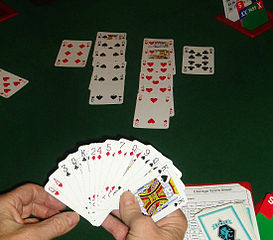This is RPG-ology #17: With the Odds, for April 2019.
A few years ago I launched the mark Joseph “young” web log with post #1: Probabilities and Solitaire, which talked about how to improve your success at that and other card games by considering the odds of any particular lay of the cards. I do use those rules when I play the game, and this evening (by now probably a year ago) as I played I was in a situation in which the two black queens (with other cards descending from them) were atop the two right-hand piles, one atop five cards and the other atop four. A red king appeared to the left, and I had to choose which queen to move.

Recalling the rule, I moved the queen from atop five cards, and continued play as the cards which were freed were one after another moved into other positions. The fifth, the bottom card, was the other red king, and I immediately shifted the other black queen to open the other pile. As I did so the phrase against the odds came to mind, which was in a sense true, as it was improbable that the red king would have been on the bottom of that pile given all the places it might have been—but my mind immediately corrected me that this was with the odds: I had recognized that the red king was more likely to be in the pile with more concealed cards than the pile with fewer, and it in fact was.
Of course, it might not have been, but Damon Runyon said, “The race is not always to the swift nor the battle to the strong, but that’s the way to bet.” If you know the odds, and you want to win, you act in accordance with your best chance of success. Bridge players learn the odds of cards being one way or another, and play to the best chance to win. Knowing the odds of success, and knowing how to make them better, is the best tool for winning in most games.
It’s different with sports and casino betting. The house sets the odds according to the probability of success, such that although you will probably lose betting on a longshot, if you win you get a better return on the bet. That helps lure gamblers into “sucker bets” so they will lose a lot of money in small wagers on long odds, and the big payouts are a small portion of the total take and an incentive to others to take the chance. It also helps cover the winners who bet on the favorite, as if it’s obvious who is going to win and he does win, there will be a lot of winning bets to cover.
Having recognized this many years ago, I devised ADR’s and Surv’s—calculations of the average damage per round an Advanced Dungeons & Dragons™ character could deliver and the number of attacks he could survive as comparative numbers. It enabled my characters and the others in my party to identify which were their best attack forms in various situations, and let us build strategies on who could deliver the most damage and who could survive the longest in a fight. I still use a spreadsheet version of the program today when I play or run that game, and while the calculation itself doesn’t port well even to other editions of the game, the factors may well help you recognize the strengths of your own characters in other games.
Even if you don’t care to stretch your math skills to calculating odds, you should try to get a genuine feel for them, to know when things are likely to fall in your favor, and when they are likely to fall against you. If the odds favor a particular course of action, that’s the way to play; if the odds are against you, it’s time to retreat.
That seems obvious. What is not quite so obvious is that in life we have to guess quite a bit about odds involving factors outside our knowledge. In a game, we can quantify enough of the information to do the math, quite literally, and know the probable outcome. Of course, probable outcomes are not guaranteed, but they are always more likely than improbable ones.
